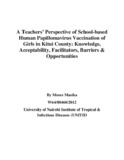| dc.contributor.author | Masika, Moses | |
| dc.date.accessioned | 2014-12-08T12:52:38Z | |
| dc.date.available | 2014-12-08T12:52:38Z | |
| dc.date.issued | 2014 | |
| dc.identifier.citation | Institute of Tropical & Infectious Diseases,2014 | en_US |
| dc.identifier.uri | http://hdl.handle.net/11295/76572 | |
| dc.description.abstract | Background
Cervical cancer is the leading cause of cancer-related morbidity and mortality among women in
sub-Saharan Africa. Two effective Human papillomavirus vaccines are available as means of
preventing the disease. School-based vaccination has been identified as a viable delivery method
but there is need understand the local environment for optimal vaccine delivery and uptake among
adolescent girls in schools.
Objective
To assess knowledge and acceptability of HPV vaccine in primary school teachers in Kitui County
and explore the facilitators, barriers and opportunities presented by the HPV vaccination of class
four girls.
Methods
This was a cross-sectional, mixed methods study conducted in Kitui Central Division of Kitui
County where the Ministry of Health is administering the quadrivalent HPV vaccine to all class
four girls. Self-administered questionnaires were filled by 339 primary school teachers and two
focus group discussions with a total of 13 participants were held. We collected data on awareness,
knowledge and acceptability of HPV vaccine as well as facilitators, barriers and opportunities
presented by the project. Analysis was done using SPSS® (quantitative data) and ATLAS.ti®
(qualitative data) testing associations using chi-square for categorical variables and t-test for
numerical variables.
Results
Sixty percent of the respondents were female. The mean age was 40 years (standard deviation (SD)
= 10.7). Nearly all were Christians (99%), 1% were Muslims. Most respondents (90%) were aware
of the vaccination exercise. The average score on knowledge was 48% with women scoring
significantly higher than men (50% vs 46%, p=0.002). The level of knowledge about HPV and
cervical cancer among teachers was moderate (48%, SD = 10.9). Most teachers would recommend
the vaccine to their daughter or close relative (89%). Teachers who would recommend the vaccine
had more knowledge than those who would not (49% vs 40% p=<0.001). Nearly all teachers
wanted to know more about HPV vaccine (98%). Most felt that the vaccine was safe (79%) and
should be continued (93%). The main barriers reported by the teachers were insufficient
information about the vaccine, poor accessibility of schools, absenteeism of school girls on vaccine
days and fear of side effects.
Conclusion and Recommendations
Despite low to moderate levels of knowledge about HPV vaccine in the study population, vaccine
acceptability is high. Nevertheless, knowledge and awareness had a significant effect on whether
teachers would recommend the vaccine to their daughter or close relative or not. There is need to
come up with cost-effective means of disseminating information on HPV vaccine among teachers,
parents and pupils in our settings. | en_US |
| dc.language.iso | en | en_US |
| dc.publisher | University of Narobi | en_US |
| dc.title | A Teachers’ Perspective of School-based Human Papillomavirus Vaccination of Girls in Kitui County: Knowledge, Acceptability, Facilitators, Barriers & Opportunities | en_US |
| dc.type | Thesis | en_US |
| dc.description.department | a
Department of Psychiatry, University of Nairobi, ; bDepartment of Mental Health, School of Medicine,
Moi University, Eldoret, Kenya | |
| dc.type.material | en_US | en_US |

